Stories published August 1998
reviewed by Mark R. Kelly
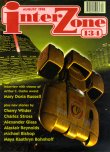 Interzone August 1998
Interzone August 1998
(issue profile)
Alastair Reynolds, ''Stroboscopic''
An expert gamer gets a preview of a new release in the form of an alien creature that responds to brief pulses of light. At the game's premiere he realizes he's been tricked: trapped in the environment of a pulsar planet's ecology, he's forced to think fast to avoid defeat. A Larry Niven-esque hard SF puzzle about pulsars and piezoluminescence, the story's biological premise is questionable but its puzzle is cleverly and fairly solved.
Cherry Wilder, ''The Bernstein Room''
A Frankfurt museum creates a new ''amber room'' similar to the famous one owned by a Russian Czar, plundered by the Nazis and lost since then (''bernstein'' is German for amber). The exhibit is popular until rumors about genetically engineered substances, and their effects on moods, trigger public hysteria. The putative mood effects lend an intriguing ambiguity to the emotional subplot involving the museum worker, her father, and her lover.
Alexander Glass, ''Loop''
The fourth story within five consecutive Interzone issues by a new young writer from London. The stories are all short, 2-3000 words, but show impressive variety. This one is about a probe in deep space that realizes it is lost. Then it realizes that all the stars around it are blue-shifted, and it witnesses a cosmological realignment signaled by the story's title. The idea is a bit sketchy, but Glass's range and imagination mark him as a new writer to watch.
(Fri 24 Sep 98)
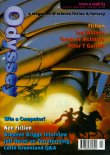 Odyssey Issue 4
Odyssey Issue 4
(issue profile)
Ian Watson, ''The Shape of Murder''
''The greatest detective in the universe'' is brought into existence by the collective will of the passengers of a starship where two murders have taken place. The Frenchman encounters an alien ambassador, a lovely lady wearing a sapphire fetish, and the ship's deplorable cuisine before gathering everyone in the saloon to announce the mystery's solution. The surprise is in how he knows. The mystery is contrived and a bit silly at times, but it's also stylish, witty, and clever.
(Tue 15 Sep 98)

|
Event Horizon August 1998
(issue profile)
Pat Cadigan, ''The Final Re-Make Of The Return of Little Latin Larry, With a Completely Re-Mastered Soundtrack And the Original Audience''
An aroma bar bartender describes her part in the dramatization of the history of a Latin singing group from before the Collapse and Rebuilding. The medium is a kind of interactive VR; the method is to interpolate the biochemical memories of the descendants of Latin Larry's players or of people who saw them. The results are surprising, crazy, and funny -- you can tell from the very beginning that memories of the 20th century aren't as reliable as everyone thinks they are. This story first appeared in last year's extremely-limited-edition corporate anthology Future Histories; this marks its first widespread availability. The story serves that anthology's theme of examining future communications technologies even as it dazzles with musical riffs and subversive ideas about the dramatic arts.
(Sun 16 Aug 98)
|
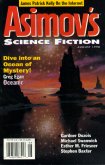 Asimov's August 1998
Asimov's August 1998
(issue profile)
Greg Egan, ''Oceanic''
The setting is unusual for Egan, a far-future water world with a Le Guinian human-variant society where sexual roles are physically interchangeable and the home-grown religion is centered on Beatrice, the daughter of God. The story follows Martin from his boyhood faith in Beatrice's love through an academic and social career that causes him to gradually question his faith and examine its biochemical origins. Martin's acceptance of the implications of science and rationality parallels the bleak conclusion of Egan's major story last year, ''Reasons to Be Cheerful''; like it, this story challenges the worldviews of both its characters and its readers in ways that little modern SF even bothers to attempt.
Robert Reed, ''Savior''
A young boy goes hunting with his grandfather, a hero of the war against the aliens, whose dead starship hangs in the sky. When Grandpa is threatened with arrest for war crimes, the boy struggles to understand how justice is being served. The background is SFnal but the conflict intensely emotional: a moving character-driven SF story to rank with Reed's best.
Gardner Dozois and Michael Swanwick, ''Ancestral Voices''
A malevolent creature is trapped in a snow-bound Vermont country house with a family that succumbs to its irrational hunger one by one. A gripping horror story that surprises at the end with slightly too neat SFnal rationale.
Stephen Baxter, ''Dante Dreams''
A Jesuit scientist has found a new theory of everything and then committed suicide; now her virtual reconstruction is being interrogated by a UN sentience cop for possible violation of AI law. Answers lie in translations of Dante, whose perception of the universe paralleled modern 4-dimensional cosmology. Baxter's conceptual links are remarkable, if not terribly persuasive.
(Fri 14 Aug 98)
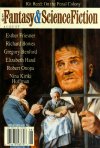 F&SF August 1998
F&SF August 1998
(issue profile)
Kit Reed, ''On the Penal Colony''
The historical theme park of Old Arkham, Massachusetts is populated by prison inmates performing scripts and kept in place with anklets and belts that zap them if they get out of line. The warden lectures on the virtues of this arrangement, but he can't control certain powerful human emotions. Sardonic and unsettling.
Jan Lars Jensen, ''The Pacific Front''
The crew of a bomber that's gone down on a Pacific island while on its way to Kyoto includes a Japanese-American who's loyal to his country but suspected by the others, who try to hide the secret of the bomber's cargo compartment. Some historical elements are less plausible than others, but the writing is strong. Jensen is a new writer to watch.
Robert Onopa, ''The Grateful Dead''
A satiric view of the future death industry, in which Grateful Dead, Inc. co-founders deal with complaints from customers about noisy burial urns, and scheme to attract new business by bouncing signals off a passing comet. This causes the comet to change course and head straight for Earth. Scientifically it's mostly nonsense, but in the context of a social satire it's silly fun and not the offensive stupidity of a Hollywood movie.
Richard Paul Russo, ''Butterflies''
Mason finds himself in a jungle with no memories except for his name, listening to radio signals from hunters apparently pursuing him. He finds that the radio signals enable him to transport himself into other settings, and as he does his memories gradually return. The rationales are traditional, the effect rather like a computer game: in all, a well-told variation of a classic SF situation.
(Fri 14 Aug 98)
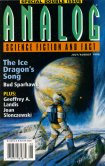 Analog July/August 1998
Analog July/August 1998
(issue profile)
Stephen Baxter, ''Moon-Calf''
A retired Apollo astronaut on a book tour visits a chapel made of basalt in a remote Welsh town and hears speculation that the Chinese might have advanced technologically far in advance of Europeans, were it not for their eunuchs. The chain of connections is artfully forged, with Baxter evoking memory and wishful thinking more than he explores the alternate history he suggests.
G. David Nordley, ''A Life on Mars''
Pete Nelson and his daughter contrive a way to reach Mars from the Moon in a single day aboard an experimental mass beam-rider spacecraft. Nordley sensitively depicts fractured family relationships while expertly ratcheting the tension in a dangerous high-tech situation.
Bud Sparhawk, ''The Ice Dragon's Song''
On Europa, a world with a core of liquid ocean, 14 year old Paul sets off on skis for help after a subsurface disruption wrecks his family's habitat. His feelings of inadequacy manifest themselves as visions of ice dragons, the fanciful name for Europa's geysers. The story ratchets the tension more predictably than Nordley's does, but its resolution mostly avoids the cliches of the heroic adolescent survival tale.
Alexandr Kramer, ''That Invincible Human Spirit, or, The Golden Ships'' and
Erik Simon, ''Ikaros''
Two tales by Eastern Europeans curious for their treatments of familiar SF ideas independent of the American/British tradition. Kramer imagines enormous alien ships hovering in the skies of Earth and their impact on human civilization. Simon investigates the wreck of an alien world and speculates on common motivations of all intelligent races.
(Wed 22 Jul 98)


 Interzone August 1998
Interzone August 1998 Odyssey Issue 4
Odyssey Issue 4
 Asimov's August 1998
Asimov's August 1998 F&SF August 1998
F&SF August 1998 Analog July/August 1998
Analog July/August 1998